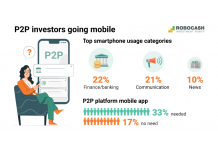The Continental European P2P Market to Grow by 20% in...
- 05.12.2023 08:40 am
Robocash Group Served 20 mln Customers
- 28.04.2022 10:55 am
Global Currencies, Stocks and P2P Investments are...
- 21.04.2022 03:10 pm
Rise in Investments by Millennial Women in P2P...
- 08.03.2022 01:40 pm
European P2P Investors Gradually Going Mobile
- 03.03.2022 10:40 am
Robo.cash Celebrates Its 5th Anniversary With a Record...
- 21.02.2022 11:45 am
Interest for P2P Loans to Ggain Traction in Europe
- 21.12.2021 11:50 am
The European P2P Market on the Way to Diversity
- 11.11.2021 02:15 pm
Robocash Secondary Market Transactions Increased 11...
- 21.10.2021 03:10 pm
Gujarat Witnesses 86% Rise in P2P Investments:...
- 20.10.2021 04:30 pm
Mature P2P Platforms to Recover More Than 9% Above...
- 14.10.2021 01:10 pm
Robo.cash Exceeded 300 M Euro of Funded Loans
- 21.09.2021 02:05 pm






















